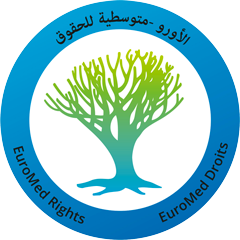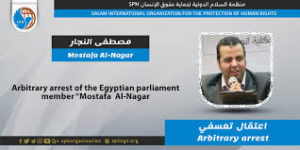
Credit: Arab Center
A wave of economic austerity is squeezing the Arab world’s middle class, pushing a segment of society that is key to growth and stability into making painful cutbacks and fueling discontent, Jared Malsin and Amira El-Fekki write for the Wall Street Journal:
Austerity measures, in turn, have sparked resentment and sporadic protests, and contributed to political crises this year in Jordan and Tunisia in which middle-class grievances played a central role. The protests have stirred memories of the Arab Spring revolts, which toppled a number of governments and united the poor and middle class over shared complaints. Discontent among the middle class should worry Arab leaders, said Messaoud Romdhani, president of the Tunisian Forum for Economic and Social Rights, a civil-society group.
“For decades, the middle class kept a peace in society,” said Mr. Romdhani. “Now they are losing ground. Nurses and civil servants, they’re getting closer to the poor. There’s a sense of dislocation.”
Bread-and-butter issues
“People are getting really fed up,” said Issandr El Amrani, the Morocco-based head of the North Africa Project at International Crisis Group. “There’s a real focus on these bread-and-butter issues, rather than the more ideological issues of a few years ago.”
While the Arab Spring created room for political openness by toppling Tunisia’s autocratic despot, President Zine el Abidine ben Ali, it also cast a spotlight on long-standing economic and religious grievances, Melissa Etehad writes for The Los Angeles Times:
Tunisians make up one of the largest groups of nationals that joined extremist groups in Syria, Iraq and Libya. Of the estimated 40,000 foreign fighters that fought for Islamic State alone, upward of about 7,000 were Tunisians, according to a 2015 report from the Soufan Group, a security firm based in New York….Released from prison with the fall of Ben Ali, jihadists and leaders of Tunisia’s militant group Ansar al Sharia were able to openly spread their ideology.
 “In North Africa, the Arab Spring and its aftermath created opportunities for jihadists to organize and mobilize on a wider scale than previously possible,” said David Sterman, senior policy analyst at New America’s International Security program and coauthor of the study. “The fighters were socioeconomically underprivileged and came from regions characterized by a lack of access to economic and political power.”
“In North Africa, the Arab Spring and its aftermath created opportunities for jihadists to organize and mobilize on a wider scale than previously possible,” said David Sterman, senior policy analyst at New America’s International Security program and coauthor of the study. “The fighters were socioeconomically underprivileged and came from regions characterized by a lack of access to economic and political power.”
The United States can do a great deal more to help and protect individuals like Jamal Khashoggi in the Middle East today who seek to expose corruption and advocate fundamental liberties such as exercising freedom of expression, notes Vance Serchuk, an adjunct senior fellow at the Center for a New American Security.
Most fundamentally, American officials at the highest level should make clear to their counterparts in Arab governments that the fate of journalists, dissidents and government critics is not a matter of indifference to Washington or to the American public. Independent of U.S. security or economic interests, Arab leaders must understand that abuse of their citizens will have a direct impact on relations with the United States, he writes for The Washington Post:
- Top U.S. leaders – including the president, vice president and secretary of state – can reinforce this message by personally engaging representatives of Arab civil society, welcoming them and their family members to the White House and the State Department, and meeting with them when traveling in the Middle East.
 This is also something that members of Congress and their staffs should be doing, independent of the administration. Senators and representatives seized by the Khashoggi murder would do well to open their offices to Arab dissidents and activists, and to champion the cases of those being unjustly detained or harassed.
This is also something that members of Congress and their staffs should be doing, independent of the administration. Senators and representatives seized by the Khashoggi murder would do well to open their offices to Arab dissidents and activists, and to champion the cases of those being unjustly detained or harassed.- For those uncertain where to start, there is no shortage of nonpartisan think tanks and other advocacy organizations – including the Project on Middle East Democracy, Freedom House and Human Rights Watch – that can connect congressional offices with respected individuals doing heroic work in dangerous circumstances.
- Congress can also increase funding for organizations such as the National Endowment for Democracy that help embattled civil society across the Middle East, and for U.S.-sponsored Arabic-language media such as Alhurra that give these organizations a platform. RTWT

Getty
Prosecutors in Rome have formally opened an investigation into five Egyptian secret service members and police investigators in connection with the alleged 2016 torture and murder of an Italian researcher, AP reports:
The five were being investigating on possible abduction charges related to the January 2016 murder of Giulio Regeni, 28, who was allegedly abducted and tortured for several days before his body was left on a highway north of Cairo. Mr Regeni was a Cambridge University student, undertaking research in Cairo for his doctorate, when he went missing on January 25, 2016. His body was found on February 3.
 Human rights and democracy advocates continue to express concern over the disappearance of former Egyptian lawmaker Mustafa el-Nagar. He went missing on September 27 while traveling to the southern city of Aswan, and his wife, Shaymaa Afifi, fears he may have been detained by security forces. El-Nagar, co-founder and former MP for the Justice Party, had previously been convicted of “insulting the judiciary” and sentenced to three years in prison, but was released on appeal. He did not attend his October 15 Court of Cassation hearing, at which his appeal was denied.
Human rights and democracy advocates continue to express concern over the disappearance of former Egyptian lawmaker Mustafa el-Nagar. He went missing on September 27 while traveling to the southern city of Aswan, and his wife, Shaymaa Afifi, fears he may have been detained by security forces. El-Nagar, co-founder and former MP for the Justice Party, had previously been convicted of “insulting the judiciary” and sentenced to three years in prison, but was released on appeal. He did not attend his October 15 Court of Cassation hearing, at which his appeal was denied.







